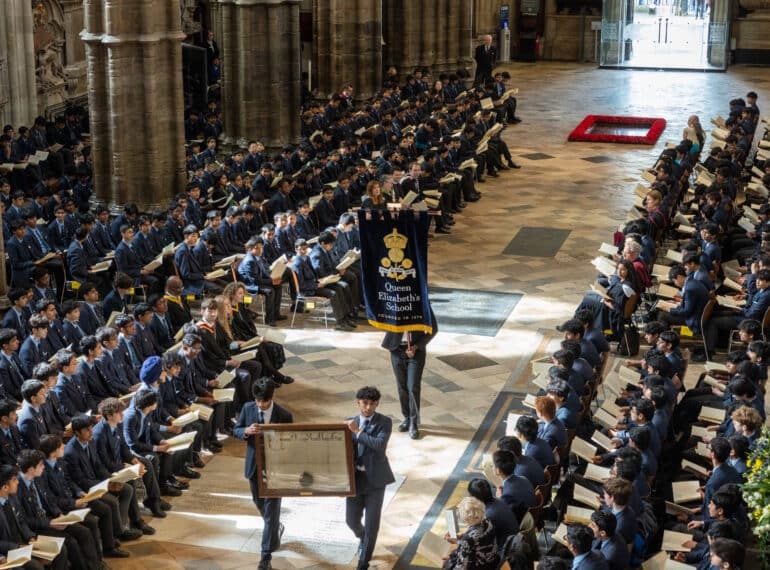
Four hundred and fifty years to the day since Queen Elizabeth I granted the Charter for the establishment of Queen Elizabeth’s School in Barnet, the Elizabethan community gathered in Westminster Abbey to celebrate in a special service of thanksgiving.
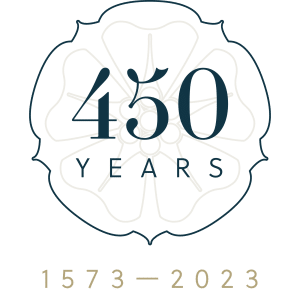 Featuring elements ancient and modern, today’s service reflected the past, present and future of a school that has in recent years risen to a place of high national repute.
Featuring elements ancient and modern, today’s service reflected the past, present and future of a school that has in recent years risen to a place of high national repute.
All 1,295 pupils attended, together with almost all staff, as well as governors, Directors of the Friends of Queen Elizabeth’s, Foundation Trustees, former staff, Old Elizabethans and around 300 current parents – a congregation of some 1,800 people.
Carried into the abbey were the Royal Charter itself, granted by Elizabeth I on 24th March 1573, and a banner that was presented to the School by HRH Prince Richard, The Duke of Gloucester, during his visit in November 2022.
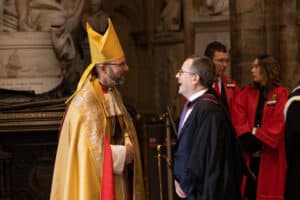 The service included religious and literary readings, with Year 11 pupil Rohan Kumar’s winning entry in the School’s 450th Anniversary Poetry Competition, and music from every century of the School’s existence, culminating in a premiere performance of an anthem commissioned from internationally renowned composer Howard Goodall.
The service included religious and literary readings, with Year 11 pupil Rohan Kumar’s winning entry in the School’s 450th Anniversary Poetry Competition, and music from every century of the School’s existence, culminating in a premiere performance of an anthem commissioned from internationally renowned composer Howard Goodall.
In his address, Neil Enright, 40th Headmaster of the School, said: “Today, we gather in this sacred and magnificent place to celebrate our School’s foundation. The place where our founder, Queen Elizabeth I, was crowned and is buried – a place of national celebration and commemoration. But, also, a place which inspires us to reflect upon our foundations, as much as our founding.”
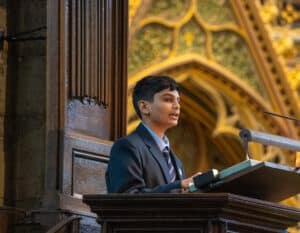 Drawing an analogy with Jesus’s parable of the foolish man who built a house on the sand and the wise man who built his house on the rock, Mr Enright said: “There have been many times over the past 450 years when the rain descended and the floods came and the wind blew and the School’s foundations were tested.”
Drawing an analogy with Jesus’s parable of the foolish man who built a house on the sand and the wise man who built his house on the rock, Mr Enright said: “There have been many times over the past 450 years when the rain descended and the floods came and the wind blew and the School’s foundations were tested.”
These storms included an outbreak of plague in 1603, when the School was said to have grown ‘sick in decay’, the imprisonment and even execution of governors for their support of the Crown during the English Civil War, straitened financial circumstances in the 18th century, the bombing of the School by the Luftwaffe in the Second World War, and the School’s decline in the 1970s and early 1980s, which saw it earmarked for closure by the local authority.
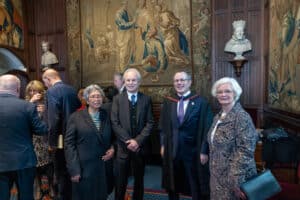 “Over the past 450 years, our remarkable school has often flourished, and always survived,” said Mr Enright.
“Over the past 450 years, our remarkable school has often flourished, and always survived,” said Mr Enright.
“Our challenge is to ensure, in a world of shifting sands, where the rain will again descend, and the floods will come and the wind will blow and beat down upon us, that we will not fall. That we will stand firm on our foundations and draw strength from our roots, spread deep and wide, and meet the bold assertion of our Charter that we will be: ‘one Common Grammar School in or near the town of Barnet… for the education, bringing up and instruction of boys and youth…… and the same to continue forever’.”
The service covered four broad themes of: foundations; challenges; service to others and hope for the future.
It was conducted by The Right Reverend Anthony Ball, Canon in Residence, and sung by QE’s Chamber Choir, with guest singers from the staff, Old Elizabethans, and St Albans High School for Girls, all conducted by Director of Music Ruth Partington. The School Orchestra was conducted by Caroline Grint, QE’s Assistant Director of Music, and the organ played by Mr Peter Holder, Sub-Organist.
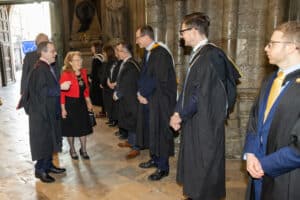 Before the service, the congregation listened to the orchestra’s performance of William Walton’s Crown Imperial and the Indian Ensemble’s performance of Tani Avartaram.
Before the service, the congregation listened to the orchestra’s performance of William Walton’s Crown Imperial and the Indian Ensemble’s performance of Tani Avartaram.
Among the guests were the headteachers of many partner schools, together with councillors, former Mayors of Barnet, and other supporters of the School.
The VIP party included: The Worshipful the Mayor of the London Borough of Barnet, Cllr Alison Moore; The Deputy Mayor of the London Borough of Barnet, Cllr Nagus Narenthira; Representative for The Lord Lieutenant of Greater London, Vice Lord-Lieutenant Colonel Jane Davis OBE QVRM TD DL; and The Lord Mayor of Westminster, Cllr Hamza Taouzzale.
After the first hymn, Helen Edmunds, Head of History, read from the Charter. Other readings were given by pupils of all ages, including 2023 School Captain Darren Lee, who is in Year 12.
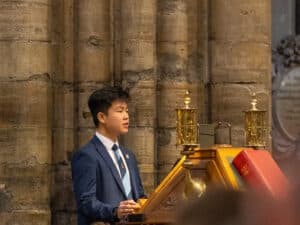 The Headmaster said the traditional Founder’s Day prayer, while others leading in prayer included Mrs Emi Aghdiran, Governor and Director of FQE, and Matthew Rose (OE 2002–09), Head of External Relations.
The Headmaster said the traditional Founder’s Day prayer, while others leading in prayer included Mrs Emi Aghdiran, Governor and Director of FQE, and Matthew Rose (OE 2002–09), Head of External Relations.
Years 7–10 had travelled to the abbey by coach; Years 11–13 came on the tube. The Headmaster led them all in an act of rededication to the School’s mission, with each of the six Houses invited to respond, in turn, with “Adsumus” (We are present).
Before the final blessing and procession, the Chamber Choir gave the first-ever performance of the new anthem commissioned by QE, which has as its refrain:
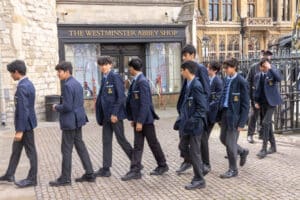 That like an oak, it draws its strength
That like an oak, it draws its strength
From ancient roots spread deep and wide.
From ancient roots
From ancient roots
From ancient roots spread deep and wide.
As the congregation departed to enjoy refreshments together, the bells of the abbey rang out.
- To view the order of service, which includes the full lyrics to Howard Goodall’s new anthem and Rohan Kumar’s competition-winning poem, click here.
- For more photos from before and after the service, click on the thumbnail images below.
- For more 450th anniversary news, click here.
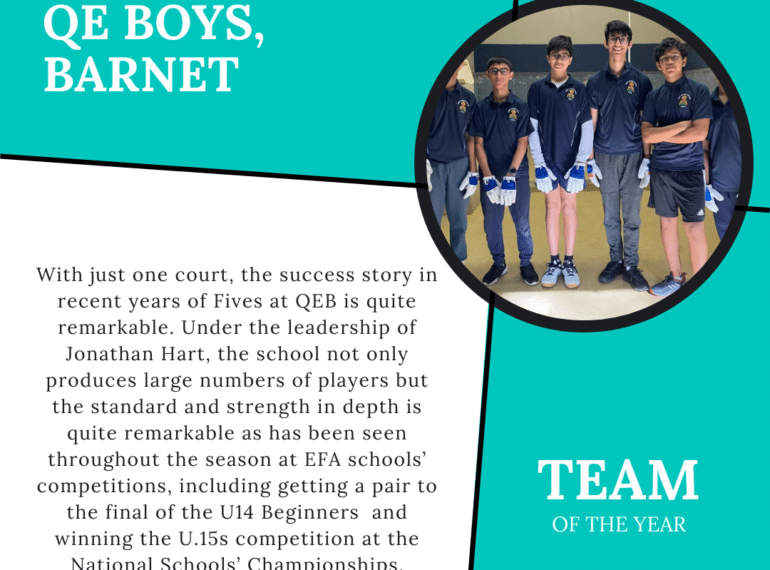
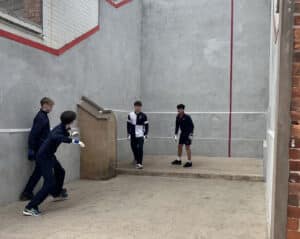 Having last year won the Eton Fives Association’s U14 Beginners’ competition, the Year 10 QE pair of Yash Kedia and Zayn Phoplankar went one better this season, becoming fully fledged U15 champions after beating Berkhamsted School’s best in the National Schools’ Championship. It is thought to be the first-ever national championship title for a QE Fives pairing.
Having last year won the Eton Fives Association’s U14 Beginners’ competition, the Year 10 QE pair of Yash Kedia and Zayn Phoplankar went one better this season, becoming fully fledged U15 champions after beating Berkhamsted School’s best in the National Schools’ Championship. It is thought to be the first-ever national championship title for a QE Fives pairing.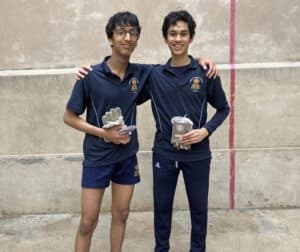 QE’s association with the sport goes back more than 140 years. Its first Fives courts at QE were opened at the School’s previous Wood Street premises in 1880, following a £10 grant from the Governors and a special fund-raising concert.
QE’s association with the sport goes back more than 140 years. Its first Fives courts at QE were opened at the School’s previous Wood Street premises in 1880, following a £10 grant from the Governors and a special fund-raising concert.
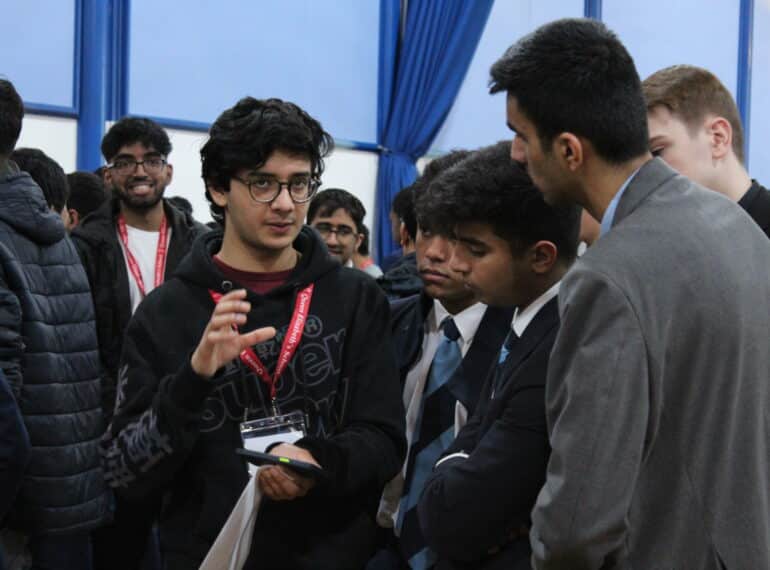
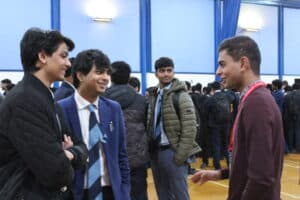 Organised as part of the QE’s extensive programme to support boys preparing for the next stage in their education, the morning event aims to provide detailed and specific guidance to the current Year 12.
Organised as part of the QE’s extensive programme to support boys preparing for the next stage in their education, the morning event aims to provide detailed and specific guidance to the current Year 12.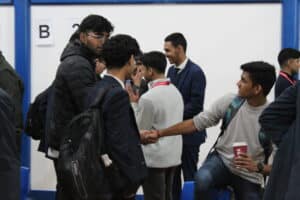 “It is so valuable for our current students to get first-hand information – the inside track – from those studying on courses and at destinations they are considering, helping them very much with the choices that they will be making later in the year,” said Mr Enright.
“It is so valuable for our current students to get first-hand information – the inside track – from those studying on courses and at destinations they are considering, helping them very much with the choices that they will be making later in the year,” said Mr Enright.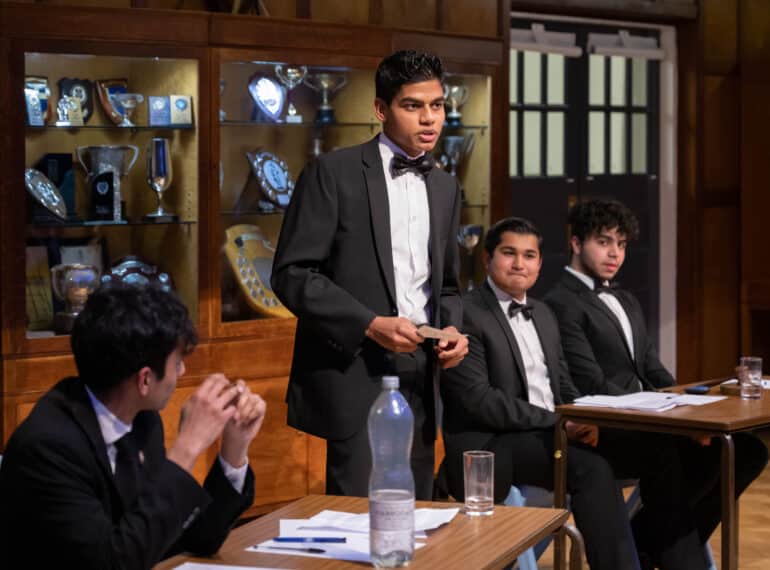
 Sixth-formers gathered to take on the visiting Old Elizabethans, debating the motion, This House would leave the past behind us.
Sixth-formers gathered to take on the visiting Old Elizabethans, debating the motion, This House would leave the past behind us.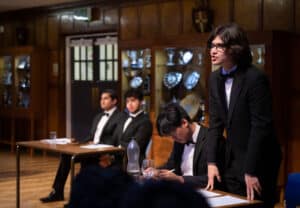 “The dinner participants also made a little bit of history themselves: our 2022 School, Captain Theo Mama-Kahn, led the loyal toast to ‘The King’, rather than ‘The Queen’, for the first time in the Dinner Debate’s history.”
“The dinner participants also made a little bit of history themselves: our 2022 School, Captain Theo Mama-Kahn, led the loyal toast to ‘The King’, rather than ‘The Queen’, for the first time in the Dinner Debate’s history.”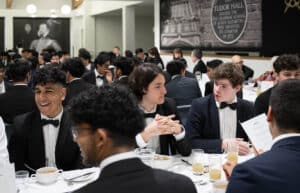 The motion was proposed by the Year 13 pair of Ashwin Sridhar and Sudhamshu Gummadavelly. Opposing it with Saifullah was Mipham Samten (OE 2012–2019). Many Year 13s contributed from the floor.
The motion was proposed by the Year 13 pair of Ashwin Sridhar and Sudhamshu Gummadavelly. Opposing it with Saifullah was Mipham Samten (OE 2012–2019). Many Year 13s contributed from the floor.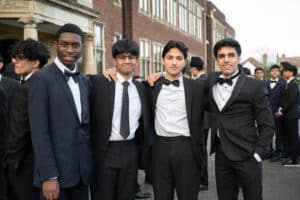 However, at the end of the debate, the proposers’ case had won many over, and the final totals were: 76 for; 55 against; and 39 abstentions. Thus, it was a victory for the School, the Upper Sixth pair successfully convincing people that the past could be left behind, even while its lessons were still being learned.
However, at the end of the debate, the proposers’ case had won many over, and the final totals were: 76 for; 55 against; and 39 abstentions. Thus, it was a victory for the School, the Upper Sixth pair successfully convincing people that the past could be left behind, even while its lessons were still being learned.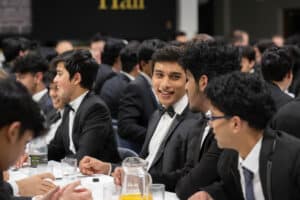 The experience heralded an era of competition success for Saifullah: he has now a record ten mooting and mock trial competitions, and has been a student speaker in six Cambridge Union Debates, the most in recent history.
The experience heralded an era of competition success for Saifullah: he has now a record ten mooting and mock trial competitions, and has been a student speaker in six Cambridge Union Debates, the most in recent history.
 The service included religious and literary readings, with Year 11 pupil Rohan Kumar’s winning entry in the School’s 450th Anniversary Poetry Competition, and music from every century of the School’s existence, culminating in a premiere performance of an anthem commissioned from internationally renowned composer Howard Goodall.
The service included religious and literary readings, with Year 11 pupil Rohan Kumar’s winning entry in the School’s 450th Anniversary Poetry Competition, and music from every century of the School’s existence, culminating in a premiere performance of an anthem commissioned from internationally renowned composer Howard Goodall. Drawing an analogy with Jesus’s parable of the foolish man who built a house on the sand and the wise man who built his house on the rock, Mr Enright said: “There have been many times over the past 450 years when the rain descended and the floods came and the wind blew and the School’s foundations were tested.”
Drawing an analogy with Jesus’s parable of the foolish man who built a house on the sand and the wise man who built his house on the rock, Mr Enright said: “There have been many times over the past 450 years when the rain descended and the floods came and the wind blew and the School’s foundations were tested.” “Over the past 450 years, our remarkable school has often flourished, and always survived,” said Mr Enright.
“Over the past 450 years, our remarkable school has often flourished, and always survived,” said Mr Enright. Before the service, the congregation listened to the orchestra’s performance of William Walton’s Crown Imperial and the Indian Ensemble’s performance of Tani Avartaram.
Before the service, the congregation listened to the orchestra’s performance of William Walton’s Crown Imperial and the Indian Ensemble’s performance of Tani Avartaram. The Headmaster said the traditional Founder’s Day prayer, while others leading in prayer included Mrs Emi Aghdiran, Governor and Director of FQE, and Matthew Rose (OE 2002–09), Head of External Relations.
The Headmaster said the traditional Founder’s Day prayer, while others leading in prayer included Mrs Emi Aghdiran, Governor and Director of FQE, and Matthew Rose (OE 2002–09), Head of External Relations. That like an oak, it draws its strength
That like an oak, it draws its strength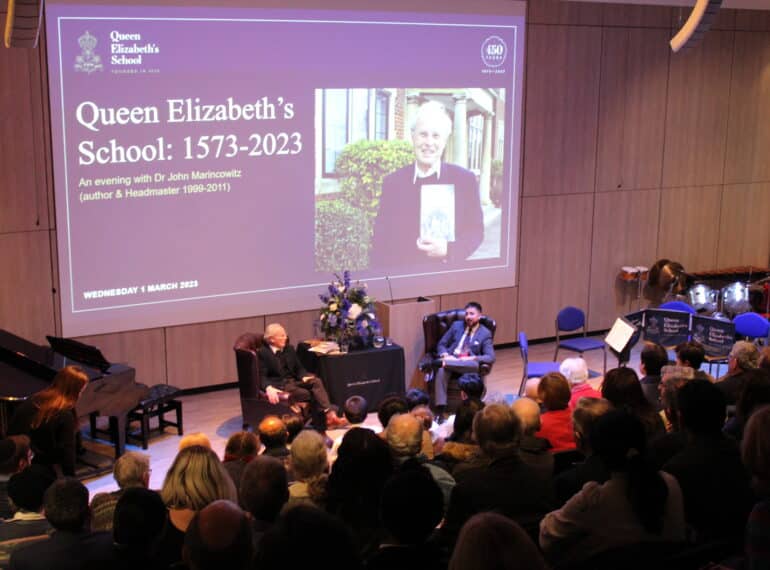
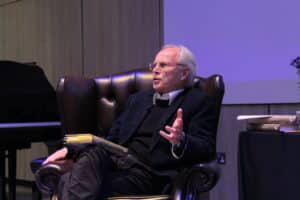 The relaxed evening event at the School drew alumni, former staff, governors and trustees, current and former parents, current boys, and other supporters of the School, as well as visitors from the local community. It was held as one of the events marking
The relaxed evening event at the School drew alumni, former staff, governors and trustees, current and former parents, current boys, and other supporters of the School, as well as visitors from the local community. It was held as one of the events marking  All profits from the sale of the book will go to The Friends of Queen Elizabeth’s (FQE) for reinvestment into the School.
All profits from the sale of the book will go to The Friends of Queen Elizabeth’s (FQE) for reinvestment into the School.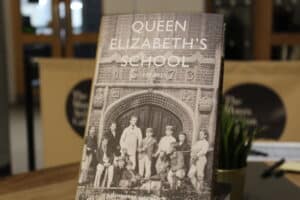 “It was fascinating to learn more about what John had uncovered through his research about this remarkable School’s rich history. His work has made a significant contribution to our understanding of the School and the context in which it has evolved over the centuries.
“It was fascinating to learn more about what John had uncovered through his research about this remarkable School’s rich history. His work has made a significant contribution to our understanding of the School and the context in which it has evolved over the centuries.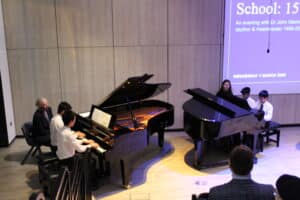 “Moreover, I was encouraged that when asked, John was fully confident that the School would still be thriving in its current location in 50 years’ time for the 500th anniversary!”
“Moreover, I was encouraged that when asked, John was fully confident that the School would still be thriving in its current location in 50 years’ time for the 500th anniversary!”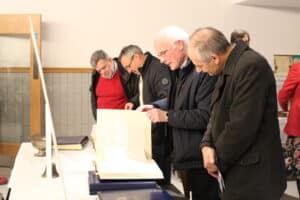 The School’s 1573 Royal Charter;
The School’s 1573 Royal Charter;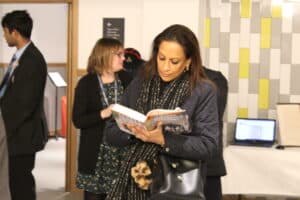 During the evening, assistance was provided by prefects and by a small number of those who have been involved with the School archives, either as part of the QE palaeography group or through Duke of Edinburgh Award scheme volunteering.
During the evening, assistance was provided by prefects and by a small number of those who have been involved with the School archives, either as part of the QE palaeography group or through Duke of Edinburgh Award scheme volunteering.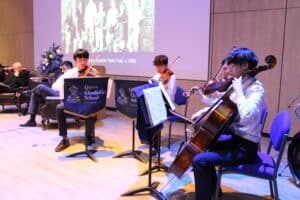 As the evening progressed, there were readings from the book and the discussion between Dr Marincowitz (Headmaster, 1999–2011) and Surya (OE 2007–2014).
As the evening progressed, there were readings from the book and the discussion between Dr Marincowitz (Headmaster, 1999–2011) and Surya (OE 2007–2014).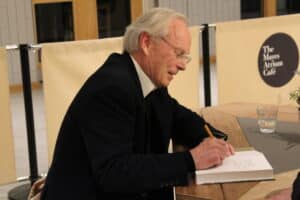 The final musical contribution came from a second piano quartet, comprising Zeyuan Wu (Year 11), Joshua John (Year 11), Zehao Wu (Year 8) and Felix Chen (Year 8), playing Saint-Saens’s Danse Macabre, arranged for eight hands. All the musical items were selected because they were based on literary stories or plays.
The final musical contribution came from a second piano quartet, comprising Zeyuan Wu (Year 11), Joshua John (Year 11), Zehao Wu (Year 8) and Felix Chen (Year 8), playing Saint-Saens’s Danse Macabre, arranged for eight hands. All the musical items were selected because they were based on literary stories or plays.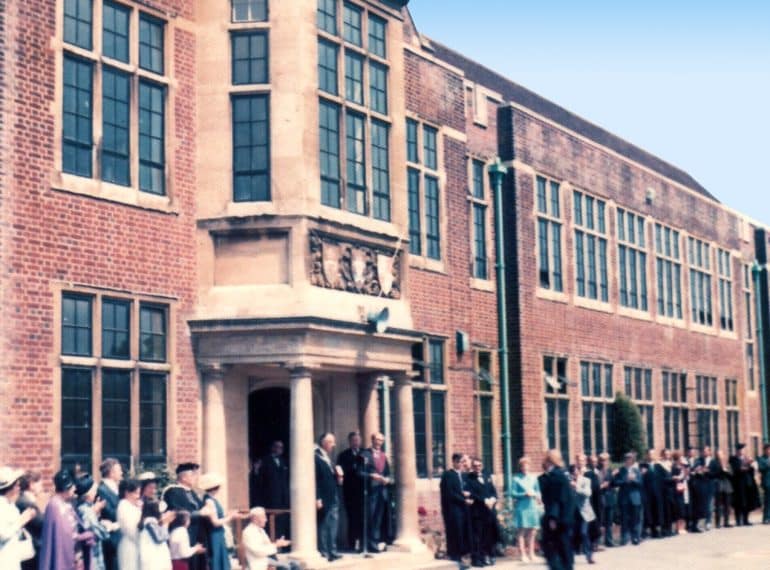
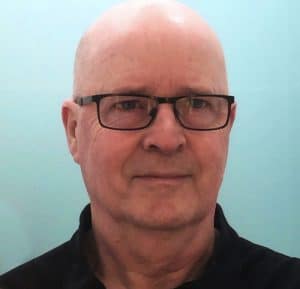 “My favourite memory of the 400th anniversary was organising the School fete. I persuaded the school to hold a joint fete with the Girls’ School and for the proceeds to go to the new Marie Foster home for multiple sclerosis about to be opened in Wood Street.
“My favourite memory of the 400th anniversary was organising the School fete. I persuaded the school to hold a joint fete with the Girls’ School and for the proceeds to go to the new Marie Foster home for multiple sclerosis about to be opened in Wood Street.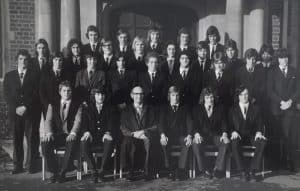 Iain was a keen sportsman. He was captain of the athletics team and played rugby on the left wing in the First XV, also playing for the county in both sports. He was the Borough of Barnet schools 100 metres sprint champion for two years. “My time of 11.2 seconds was a record that stood for several years, I think.”
Iain was a keen sportsman. He was captain of the athletics team and played rugby on the left wing in the First XV, also playing for the county in both sports. He was the Borough of Barnet schools 100 metres sprint champion for two years. “My time of 11.2 seconds was a record that stood for several years, I think.”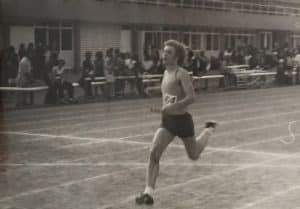 After Iain finally handed over the School Captain’s mantle to Maxwell Ball, who took over in the Autumn Term of 1973, he went on to his own English Literature degree at Warwick.
After Iain finally handed over the School Captain’s mantle to Maxwell Ball, who took over in the Autumn Term of 1973, he went on to his own English Literature degree at Warwick.